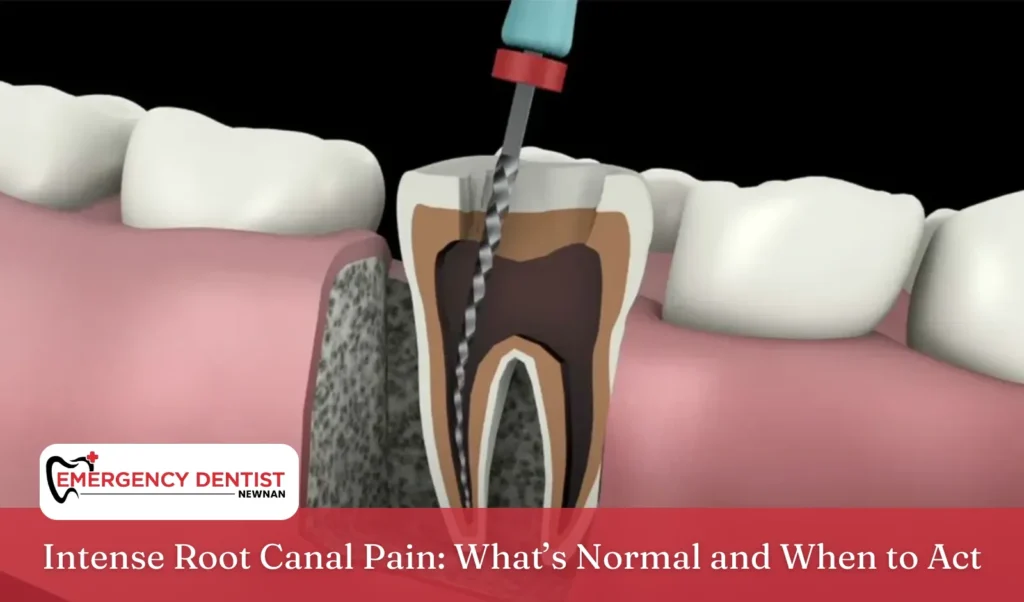Intense Root Canal Pain: What’s Normal and When to Act

Root canal therapy is a widely used dental procedure intended to treat severely infected or decayed teeth by removing the damaged pulp and preserving the tooth’s structure. While this treatment is designed to ease discomfort, many patients notice pain after root canal therapy, especially in the days immediately following the procedure.
Feeling pain after a root canal can be unsettling, but it’s often a normal part of the healing process. However, if the discomfort becomes severe or persists, it may point to complications that need prompt evaluation. In this blog, we’ll explain what level of root canal pain after treatment is typical, how to achieve root canal pain relief, and when it’s best to visit an Emergency Dentist in Newnan, GA.
What Happens After Root Canal Therapy?
During a root canal, your dentist or endodontist removes the infected tissue inside the affected tooth and thoroughly cleans the canals to eliminate bacteria. After sealing the area, a temporary or permanent filling is placed. Even though local anesthesia is used, it’s common to feel some tooth pain after root canal procedures as your mouth recovers.
You might experience:
- Gum pain after root canal
- Pain in tooth after root canal when chewing
- Pressure pain on root canal tooth
This kind of dental pain after root canal work is generally mild and temporary. Over-the-counter pain relievers and rest can help during the healing process.
Why Am I Still in Pain After a Root Canal?
Not all discomfort is the same. Here are common reasons for pain after a root canal:
- Inflamed Surrounding Tissue
Post-procedure inflammation is common. The tissue around your tooth can become irritated, leading to pain in a root canal tooth or even pain after root canal in jaw areas.
- High Temporary Filling
If your temporary filling material or crown is too high, it may cause tooth pain after root canal when biting down. This pressure pain on root canal tooth surfaces can often be resolved with a quick adjustment.
- Infection or Abscess
In some cases, infection remains even after treatment, resulting in throbbing pain or unbearable pain after root canal. An abscess may require further intervention such as root canal retreatment or antibiotics.
- Cracked or Fractured Tooth
A tooth with an undetected crack may allow bacteria to re-enter, leading to severe pain after root canal and a possible failure of the initial treatment.
What Kind of Pain Is Normal?
The type of discomfort you feel can provide clues about what’s happening:
- Mild Sensitivity: Common and usually subsides within a few days.
- Painful jaw after root canal: Could be due to keeping your mouth open during the procedure.
- Extreme pain after root canal: Not normal and may indicate a failed procedure or infection.
- Gum pain after root canal: Can be related to injection sites or local irritation.
- Pain after root canal in jaw or surrounding areas: May be referred to as pain, especially if you’re grinding your teeth.
If the pain doesn’t gradually lessen or worsens over time, it’s best to consult an Emergency Dentist in Newnan.
Effective Pain Management Tips

Here are ways to find root canal pain relief and improve comfort during your recovery:
- Use Over-the-Counter Medication
Nonsteroidal anti-inflammatory drugs like ibuprofen or acetaminophen can reduce inflammation and discomfort. These are especially helpful in managing root canal tooth pain during the first few days after treatment.
- Cold Compresses
Apply a cold pack on the outside of your cheek to reduce swelling and ease pain in the tooth after root canal therapy.
- Avoid Chewing on the Treated Side
To prevent added pressure or irritation, avoid chewing on the treated side. Stick to soft foods that are gentle on your teeth and gums.
- Practice Good Oral Hygiene
Brushing and flossing gently around the treated tooth is essential. Practicing good oral hygiene keeps bacteria at bay and helps prevent infection.
These pain management techniques can help you stay pain free and promote proper healing.
When to Contact an Emergency Dentist in Newnan, GA
Although mild pain following root canal therapy is common, there are certain signs that indicate you should seek help from an Emergency Dentist in Newnan:
- Unbearable pain after root canal
- Extreme pain days after a root canal that does not respond to medication
- Swelling in the jaw or face
- Fever or signs of infection
- Pain in tooth after root canal that spreads to other areas
In some cases, your provider may recommend root canal retreatment, antibiotics, or a tooth extraction if the infection has returned or spread to surrounding tissue.
Preventing Root Canal Tooth Pain in the Future
You can reduce your risk of after root canal pain or needing additional dental work by following these preventive steps:
- Schedule regular checkups with your dentist or endodontist
- Avoid chewing hard or sticky foods that may damage restored teeth
- Use fluoride toothpaste to strengthen enamel
- Wear a nightguard if you clench or grind your teeth
- Follow all post-procedure care instructions provided
Practicing consistent dental care supports long-term oral health and lowers the risk of future complications that could require further endodontic treatment.
Conclusion
Experiencing pain after root canal treatment doesn’t always mean something’s gone wrong. Root canal toothache pain and mild discomfort are expected as part of the healing process, especially within the first few days. With proper pain management, such as avoiding hard foods, brushing and flossing regularly, and using counter pain relievers, most people recover quickly and remain pain free.
But if severe pain after root canal or persistent symptoms develop, it’s time to consult an Emergency Dentist in Newnan, GA. Prompt care ensures any complications are addressed early, preserving your tooth and overall oral health.
With the right support and awareness, you can protect your smile and avoid long-term root canal and pain after treatment.



